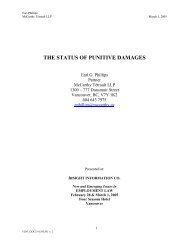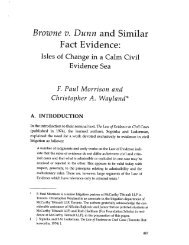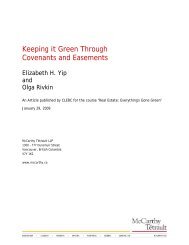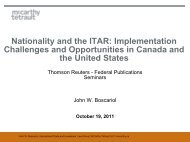The Doctrine of Public Policy in Canadian Contract Law
The Doctrine of Public Policy in Canadian Contract Law
The Doctrine of Public Policy in Canadian Contract Law
Create successful ePaper yourself
Turn your PDF publications into a flip-book with our unique Google optimized e-Paper software.
<strong>The</strong> <strong>Doctr<strong>in</strong>e</strong> <strong>of</strong> <strong>Public</strong> <strong>Policy</strong> <strong>in</strong> <strong>Canadian</strong> <strong>Contract</strong> <strong>Law</strong> 117<br />
course, public policy still renders a contract which violates it "unlawful" <strong>in</strong> the<br />
sense that it will not be enforced, but this unlawfulness is the result <strong>of</strong>, rather<br />
than the reason for, the court's logic. If contracts <strong>in</strong> violation <strong>of</strong> public policy<br />
were to be deemed "illegal" merely because the doctr<strong>in</strong>e afforded a basis for<br />
<strong>in</strong>validity, then there would be noth<strong>in</strong>g to prevent agreements fall<strong>in</strong>g with<strong>in</strong><br />
any ground <strong>of</strong> contractual <strong>in</strong>validity, such as mistake or <strong>in</strong>capacity, from also<br />
be<strong>in</strong>g so construed.<br />
Many contracts that have been held by commentators to be contrary to<br />
"public policy" have <strong>in</strong> truth simply contravened an enforceable legal obligation<br />
(whether through a crime, tort or breach <strong>of</strong> an equitable obligation).83 This is<br />
perhaps ow<strong>in</strong>g to the fact that illegality and public policy are <strong>of</strong>ten difficult to<br />
dist<strong>in</strong>guish. Indeed, it is not hard to imag<strong>in</strong>e activities that are <strong>of</strong>fensive to a<br />
fundamental public value and which at the same time are <strong>in</strong> violation <strong>of</strong> a<br />
common law obligation." Nevertheless, the dist<strong>in</strong>ction is vital. It is submitted<br />
that only a contract whose <strong>in</strong>validation has been primarily motivated by its<br />
<strong>in</strong>congruity with a fundamental value should be held contrary to "public policy."<br />
It is to the nature <strong>of</strong> such values, concealed as they are with<strong>in</strong> the various<br />
"categories" <strong>of</strong> public policy (i.e., contracts <strong>in</strong>jurious to the state and the adm<strong>in</strong>istration<br />
<strong>of</strong> justice, contracts <strong>in</strong>volv<strong>in</strong>g immorality, contracts affect<strong>in</strong>g marriage<br />
and contracts <strong>in</strong> restra<strong>in</strong>t <strong>of</strong> trade) that we now turn.85<br />
"[i]n the former group <strong>of</strong> cases... [t]he court itself makes the judgment as to what is public<br />
policy... In the case <strong>of</strong> an agreement that is contrary to a statute, though <strong>of</strong> course public<br />
policy rema<strong>in</strong>s the root reason for <strong>in</strong>tervention, the court does not itself make the judgment<br />
<strong>of</strong> what is public policy". It is submitted that this dist<strong>in</strong>ction is applicable to all contracts<br />
which are "illegal" ow<strong>in</strong>g to either statute or common law — <strong>in</strong> both cases, the <strong>in</strong>terest at<br />
stake (i.e., the legal obligation <strong>of</strong>fended) is worthy <strong>of</strong> protection ow<strong>in</strong>g to its source,<br />
regardless <strong>of</strong> its normative importance. However, <strong>in</strong> the case <strong>of</strong> public policy, the <strong>in</strong>terest<br />
at stake (i.e., the value or social obligation <strong>of</strong>fended) is deemed worthy <strong>of</strong> protection<br />
because <strong>of</strong> its normative importance.<br />
83 An excellent example <strong>of</strong> this is Ontario (<strong>Public</strong> Guardian & Trustee) v. AIDS Society for<br />
Children (Ontario) (2001), 2001 CarswellOnt 1971, [2001] O.J. No. 2170 (Ont. S.C.J.),<br />
where the Court found contrary to "public policy" an agreement between a charity and<br />
its agent, whereby the former agreed to pay the latter 70 per cent <strong>of</strong> the monies which the<br />
agent obta<strong>in</strong>ed from the public on the charity's behalf, <strong>in</strong> circumstances where the public<br />
were not <strong>in</strong>formed that virtually no money would be applied to the charitable purpose.<br />
This f<strong>in</strong>d<strong>in</strong>g is clearly attributable to the misrepresentations made to the public (which,<br />
<strong>in</strong>deed, formed an alternative basis for the Court's conclusions). See also Neville v.<br />
Dom<strong>in</strong>ion <strong>of</strong> Canada News Co. Ltd., [1915] 3 K.B. 556 (C.A.) and the explanation given<br />
for this decision by Buckley, supra note 8 at para. 7.27.<br />
84 In certa<strong>in</strong> cases, such as contracts <strong>in</strong>volv<strong>in</strong>g ma<strong>in</strong>tenance and champerty, the common<br />
law obligation is <strong>in</strong>dist<strong>in</strong>guishable from public policy.<br />
85 <strong>The</strong>se "categories" <strong>of</strong> public policy <strong>in</strong>volve cases where "public policy has partially<br />
precipitated itself <strong>in</strong>to recognised rules which belong to law properly so called, but where<br />
these rules have rema<strong>in</strong>ed subject to the mould<strong>in</strong>g <strong>in</strong>fluence <strong>of</strong> the real reasons <strong>of</strong> public<br />
policy from which they proceeded" (Rodriguez v. Speyer Brothers, [1919] A.C. 59 (H.L.)<br />
at 81). <strong>The</strong>y may accord<strong>in</strong>gly be dist<strong>in</strong>guished from cases which have crystallized <strong>in</strong>to a<br />
positive rule <strong>of</strong> law (such as the rule aga<strong>in</strong>st perpetuities or restra<strong>in</strong>ts on alienation), and
















